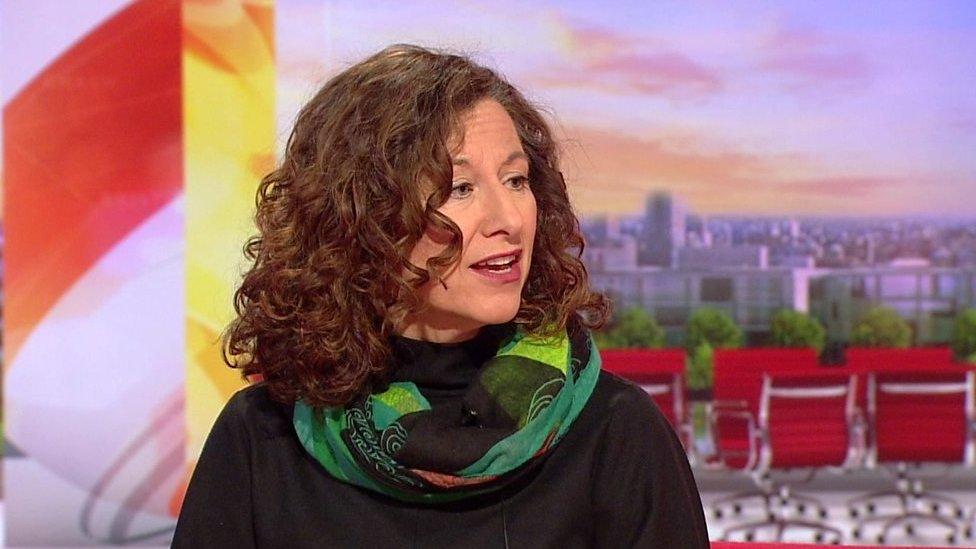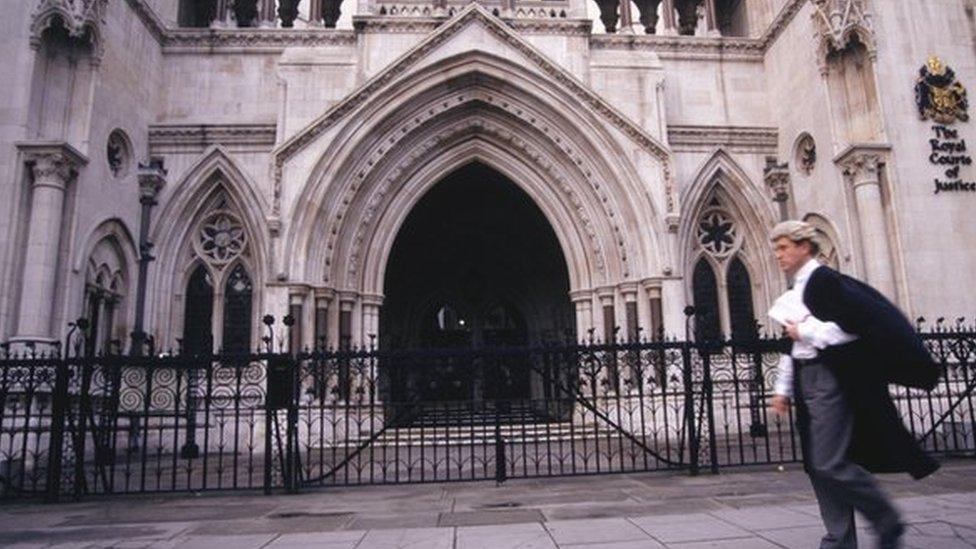Vulnerable witnesses 'denied help to give evidence'
- Published
How a specialist helped a two-year-old witness to give evidence
Scores of children and vulnerable people are being denied support to access justice in England and Wales due to a shortage of specialists, the victims' commissioner has warned.
Baroness Newlove said up to 250 witnesses a year do not get the help they need from trained intermediaries to give evidence to police and courts.
She said the "worrying" shortage needs "addressing urgently".
The Ministry of Justice (MoJ) said more specialists were being recruited.
Since 2008, police have been able to use registered intermediaries (RIs) to ensure children and adults with communication difficulties are able to give coherent and accurate evidence during police interviews and criminal proceedings.
There are currently 135 active RIs in England and Wales.
Baroness Newlove said children were waiting an average of four weeks to be matched to RIs so they could give evidence.
She told the BBC: "That is horrendous. There shouldn't be a waiting game for these people to have to communicate the most traumatic things that have happened to them."
A registered intermediary's tasks include:
assessing the communication needs of a victim or witness
adapting questions to make them more suitable to put to the witness during cross-examination
accompanying the witness when they give evidence in court
alerting the court to miscommunications that could affect the reliability of their evidence
Nicola Lewis, who works as an RI in London, said: "There are simply not enough of us - I'm booked until the end of February and can't take on any more cases.
"Some forces don't even request an RI because they know they can't get one."
The report produced by the victims' commissioner praised the work of RIs as "invaluable" but found "systemic failure" in the way the service was managed.
The review raised concerns over the four-week delay in matching RIs to witnesses, which was problematic in cases involving children with shorter memory spans.
It also noted that, despite a four-fold increase in requests, there had not been a similar increase in recruitment levels, and on average, 20 requests for RIs every month were not met.

Analysis
By BBC legal correspondent Clive Coleman
In her report, Baroness Newlove gives the example of an RI helping a two-year-old victim of sexual assault to give evidence to police in an "achieving best evidence" (ABE) interview.
The ABE interview is conducted with specially trained police officers and the RI. In that case, the interview alone led to the girl's attacker pleading guilty. He was sentenced to 10 years.
The case illustrates how the work of RIs can make the difference between justice being delivered or being denied. RIs are a relatively modern addition to the criminal justice system.
They mark a recognition that young and vulnerable victims and witnesses need professional help in order to understand what is being asked of them and to give the best account of what took place.
Questions can be simplified, explained or amplified.
A rapport can be established, fear and trepidation reduced, in order to facilitate communication which puts vulnerable witnesses on an equal footing with others.

The report also said there were "wide variations" in access across the country, with, for example, five times as many requests for RIs in Cumbria compared with London.
Furthermore, some RIs told the review they refused to accept work from the Metropolitan Police due to problems of late payment, with one respondent reporting they had to wait a year.
The Met said they would be investigating further.
Ms Lewis said the problem of delayed payments almost led her to quit last year, adding that many colleagues felt "incredibly isolated and don't have a voice".

Analysis
By BBC News Correspondent Sanchia Berg
The new report raises the question of "quality assurance" for registered intermediaries.
In 2010, when the system was relatively new, I reported for the Today programme on a case where an error by a registered intermediary had caused a rape case to be dropped.
The key witness, the alleged victim, was a young autistic girl.
Her family were distraught and her father told me at the time it left his daughter feeling powerless.
She'd told him: "People can do things to me and that's it."
The father told me he hoped the new victims' commissioner's report would bring in closer monitoring of registered intermediaries, and sanctions for those who made mistakes.

The Victims' Commissioner made a number of recommendations including:
establishing a centralised national service for the provision of RIs
appointing a national lead to represent the interests of RIs
ensuring that recruitment was in line with demand forecasts
Baroness Newlove, who has campaigned for victims since her husband Garry was killed 10 years ago after he was attacked by a gang on the doorstep of his house, was appointed as victims' commissioner in 2013.
She said: "My review finds that RIs are dedicated professionals, deeply committed to their work."
"Yet I don't sense they're receiving the backup they need to provide the best possible service to victims."
She added: "When you deprive victims of the support of a RI, you rob them of the opportunity to give their best evidence."
An MoJ spokesman said it had doubled the size of the RI scheme, with more than 6,500 witnesses last year receiving support and more than 90% of requests met.
"We are recruiting more RIs, improving the training available to them, and working closely with police and prosecutors to make sure witnesses are matched to an RI as swiftly as possible," the spokesman added.
- Published17 January 2018

- Published16 June 2017

- Published15 September 2016
